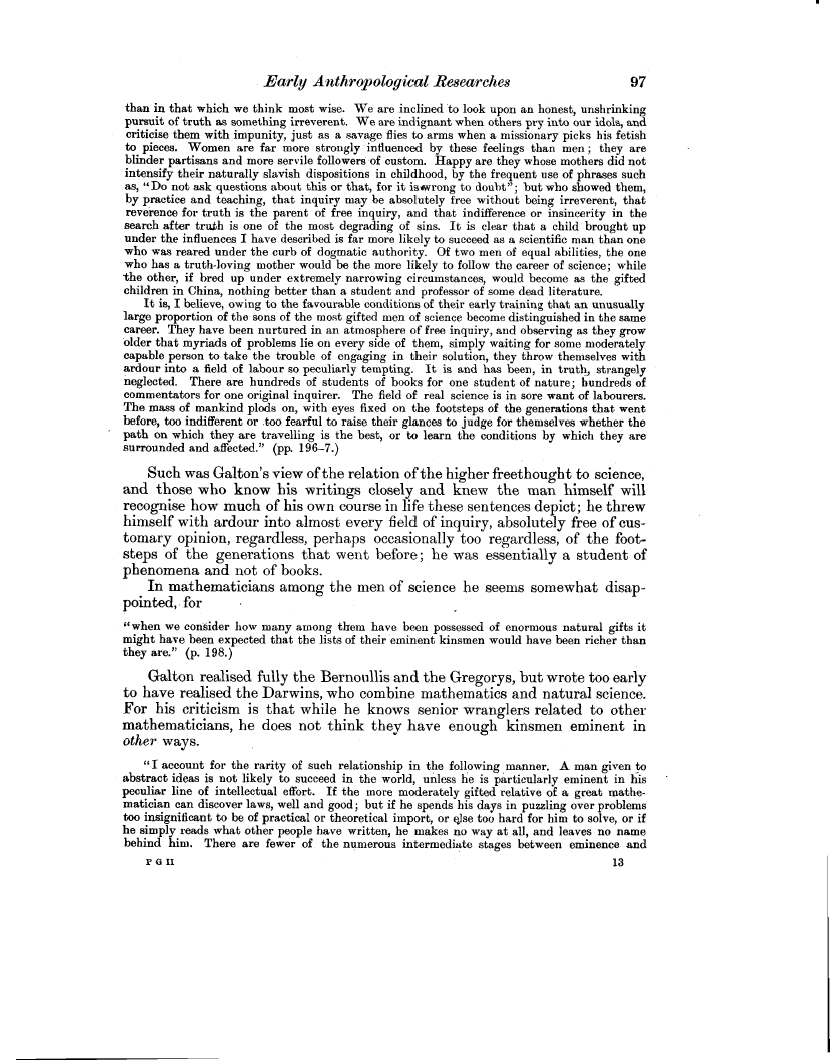Early Anthropological Researches 97
than in that which we think most wise. We are inclined to look upon an honest, unshrinking pursuit of truth as something irreverent. We are indignant when others pry into our idols, and criticise them with impunity, just as a savage flies to arms when a missionary picks his fetish to pieces. Women are far more strongly influenced by these feelings than men ; they are blinder partisans and more servile followersof custom. Happy are they whose mothers did not intensify their naturally slavish dispositions in childhood, by the frequent use of phrases such as, "Do not ask questions about this or that, for it is-wrong to doubt"; but who showed them, by practice and teaching, that inquiry may be absolutely free without being irreverent, that reverence for truth is the parent of free inquiry, and that indifference or insincerity in the search after truth is one of the most degrading of sins. It is clear that a child brought up under the influences I have described is far more likely to succeed as a scientific man than one who was reared under the curb of dogmatic authority. Of two men of equal abilities, the one who has a truth-loving mother would be the more likely to follow the career of science; while the other, if bred up under extremely narrowing circumstances, would become as the gifted children in China, nothing better than a student and professor of some dead literature.
It is, I believe, owing to the favourable conditions of their early training that an unusually large proportion of the sons of the most gifted men of science become distinguished in the same career. They have been nurtured in an atmosphere of free inquiry, and observing as they grow older that myriads of problems lie on every side of them, simply waiting for some moderately capable person to take the trouble of engaging in their solution, they throw themselves with ardour into a field of labour so peculiarly tempting. It is and has been, in truth, strangely neglected. There are hundreds of students of books for one student of nature; hundreds of commentators for one original inquirer. The field of real science is in sore want of labourers. The mass of mankind plods on, with eyes fixed on the footsteps of the generations that went before, too indifferent or too fearful to raise their glances to judge for themselves whether the path on which they are travelling is the best, or to learn the conditions by which they are surrounded and affected." (pp. 196-7.)
Such was Galton's view of the relation of the higher freethought to science, and those who know his writings closely and knew the man himself will recognise how much of his own course in life these sentences depict; he threw himself with ardour into almost every field of inquiry, absolutely free of customary opinion, regardless, perhaps occasionally too regardless, of the footsteps of the generations that went before; he was essentially a student of phenomena and not of books.
In mathematicians among the men of science he seems somewhat disappointed, for
"when we consider how many among them have been possessed of enormous natural gifts it might have been expected that the lists of their eminent kinsmen would have been richer than they are." (p. 198.)
Galton realised fully the Bernoullis and the Gregorys, but wrote too early to have realised the Darwins, who combine mathematics and natural science. For his criticism is that while he knows senior wranglers related to other
mathematicians, he does not think they have enough kinsmen eminent in other ways.
"I account for the rarity of such relationship in the following manner. A man given to abstract ideas is not likely to succeed in the world, unless he is particularly eminent in his peculiar line of intellectual effort. If the more moderately gifted relative of a great mathematician can discover laws, well and good; but if he spends his days in puzzling over problems too insignificant to be of practical or theoretical import, or else too hard for him to solve, or if be simply reads what other people have written, he makes no way at all, and leaves no name behind him. There are fewer of the numerous intermediate stages between eminence- and
PGII 13

